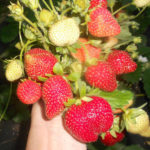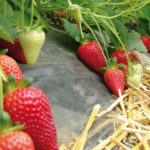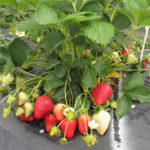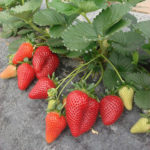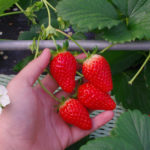Tomato variety Alsou
For those who like to eat a tomato, as they say, from a bush, we can offer a relatively new variety Alsou. It was created in 2007 by Novosibirsk breeders V.N. Dederko and T.N. Postnikov. In the State Register of Plants of the Russian Federation, the novelty was registered in the 2008th year. The tomato is approved for cultivation in all regions of Russia. Recommended for open ground and film shelters in personal subsidiary plots. It is not a hybrid, which means that you can get seeds from it for further breeding.
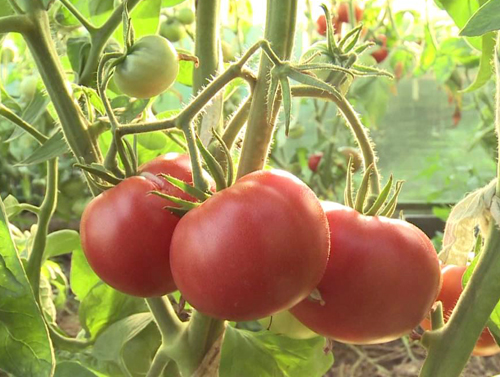
Description
The plant is determinate. In open ground it grows up to 80 cm, but in greenhouse conditions, growth is not limited to these indicators. The stem of Alsou is slightly pubescent, of medium thickness, juicy and fragile. The leaves are alternate, regular size. The leaf plate is dark green above, covered with fine villi, the underside is lighter. The inflorescence of the variety is simple, the flower is yellow. The peduncle is articulated. The internodes are medium. Brushes filled with ovaries appear every 2 leaves, sometimes more often.
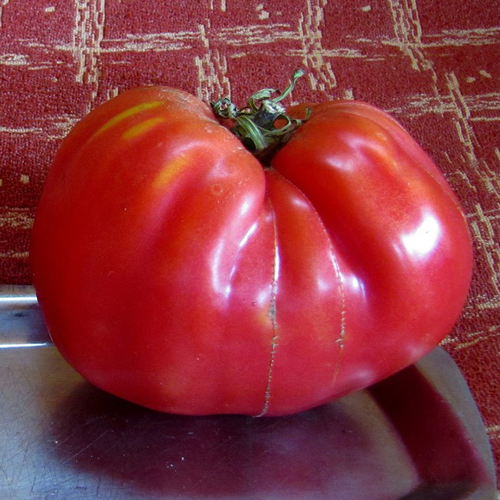
Tomato fruits are large, beautiful in appearance, kidney-shaped or heart-shaped with a weakly pronounced ribbing. According to the State Register of Plants of the Russian Federation, the average weight of fruits is 312 grams, but the applicants point to larger sizes - from 500 to 800 grams. This weight can really show the tomatoes that ripen first. The unripe fruit is light green in color with a darker spot at the stalk. Ripe - painted in an even red or pink-red tone. The skin is not thick, glossy. The pulp is red, fleshy, juicy. Alsou is characterized by multichamber - the number of seed nests is more than 6. The taste is excellent, the flesh is sugary, practically without sourness.
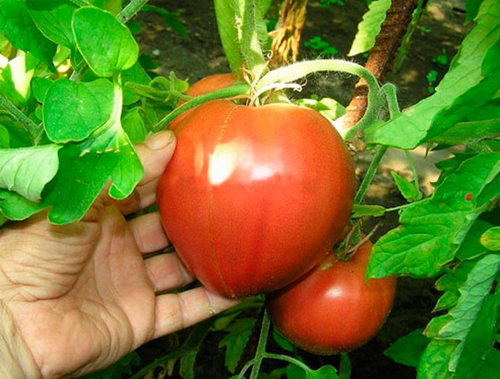
Characteristics
- The variety belongs to the early maturing - from the moment of emergence of full shoots to harvest, it takes 90 - 100 days;
- the total yield of Alsou is 7 kg per 1 square meter, in conditions of closed ground this indicator increases;
- the applicants promise high resistance to many common diseases of the nightshade family;
- tomato has good adaptation to abrupt changes in weather conditions, perfectly tolerates heat and cold snaps;
- high marketability - up to 90%;
- transportability of fruits is at an excellent level, can travel long distances;
- salad, fleshy and sugary pulp just melts in your mouth. Tomatoes are also suitable for processing into tomato products.
Agrotechnics
The most popular growing method for Alsou is seedling. For seedlings, seeds are sown 50 - 60 days before the planned transplantation to a permanent place. In different climatic conditions, sowing is carried out from late February to mid-March. The planting pattern is 40 cm between bushes in a row and a row spacing of 50 cm. There are 4 - 5 plants per 1 square meter. Bushes, especially those that grow in a greenhouse, need to be tied to a trellis or to a support. The plant is formed in 2, maximum 3 stems. Crop rotation also plays a role in getting good yields. You need to plant tomato seedlings in an area where cucumbers, greens, zucchini or cauliflower previously grew.
For the rest, agricultural technology contains techniques characteristic of the culture in general - watering, but not excessive, loosening and weeding. The variety is very responsive to fertilizers.
Alsou is a great find for those who love juicy, fleshy and large-fruited tomatoes. The plasticity of the culture and the possibility of growing it in a greenhouse allow vegetable growers, even in regions with an unstable climate, to get really good yields. Often the variety is chosen by gardeners who grow vegetables for sale, because tomato fruits have excellent commercial qualities.
Among the disadvantages is the difficulty in growing seedlings.Despite the fact that the seeds sprout very amicably, the seedlings, according to reviews, are very frail. But if you pay enough attention to them and create suitable conditions, strong plants will develop from thin seedlings.

